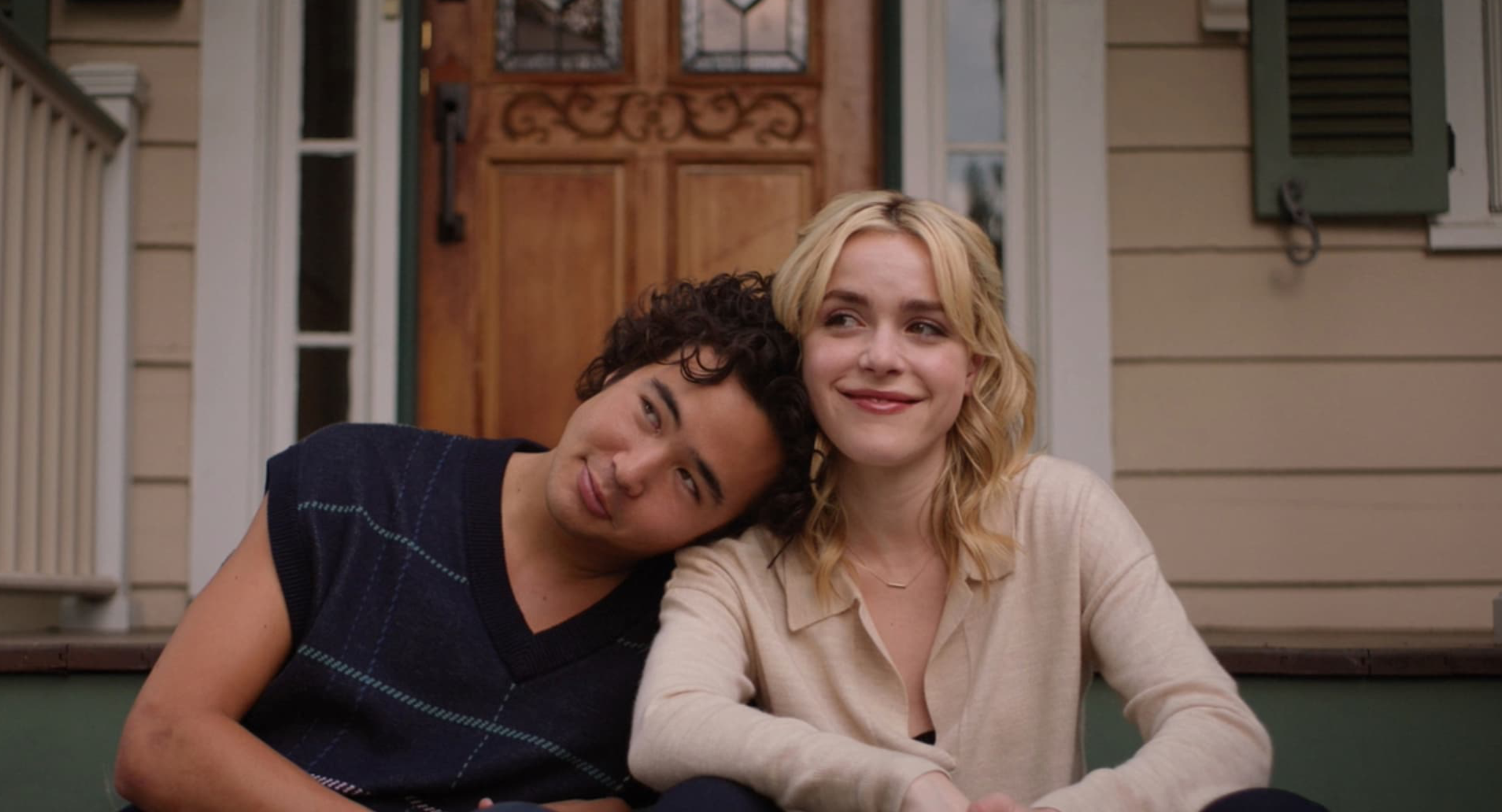Sweethearts – Film Review
Published December 2, 2024

Jordan Weiss’ feature directorial debut, Sweethearts, attempts to blend the trials of young adulthood with the complexities of friendship, love, and self-discovery. Featuring Kiernan Shipka and Nico Hiraga as college freshmen navigating their relationships with their high school sweethearts and each other, this romantic comedy sets out to tackle familiar tropes with a contemporary edge. While it offers moments of heartfelt humor and chemistry, the film stumbles with uneven pacing and underwhelming character development, ultimately delivering a middling experience.
Sweethearts aims to explore the transition from adolescence to adulthood through the lens of two best friends, Jamie (Shipka) and Ben (Hiraga). Both characters grapple with long-distance relationships that seem increasingly incompatible with their growing sense of self. Jamie’s guarded demeanor, shaped by childhood bullying, contrasts sharply with Ben’s accommodating nature in the face of his controlling girlfriend. This dynamic sets up an intriguing foundation for a story about personal growth and the evolving nature of platonic relationships.
Weiss and co-writer Dan Brier craft a narrative that mirrors many young adults’ struggles: the tension between clinging to the past and embracing the future. The decision to frame the story around a shared road trip, complete with chaotic mishaps and emotional revelations, feels like a natural fit for a coming-of-age rom-com. However, the film’s execution falters, often prioritizing situational comedy over meaningful exploration of its characters’ inner conflicts.
Kiernan Shipka and Nico Hiraga shine in moments of genuine camaraderie, their banter and mutual support reflecting the comfort of a long-standing friendship. Shipka’s portrayal of Jamie captures her prickly exterior and underlying vulnerability, though the script’s uneven focus on her struggles limits the emotional depth of her arc. Hiraga imbues Ben with a likable, laid-back charm, but his character’s lack of agency sometimes makes him feel more like a plot device than a fully realized individual.
The supporting cast, including Ava DeMary as the overbearing Claire and Caleb Hearon as the affable Palmer, add flavor to the narrative. Palmer’s subplot about self-acceptance is one of the film’s stronger elements, offering a tender and humorous exploration of LGBTQ+ themes. However, these secondary storylines often overshadow the central relationship between Jamie and Ben, diluting the film’s emotional impact.
The film’s tonal shifts are one of its most significant drawbacks. At times, Sweethearts struggles to find a balance between heartfelt introspection and comedic absurdity. For instance, the antics of Claire and Simon’s drunken escapades veer into slapstick territory, undercutting the emotional weight of Jamie and Ben’s journeys. Similarly, the frequent detours into secondary characters’ lives, while entertaining, detract from the central narrative, leaving Jamie and Ben’s arcs feeling underdeveloped.
Pacing is another issue, with the film’s road trip structure leading to a series of disjointed episodes rather than a cohesive progression. Key moments, such as the climactic confrontation between Jamie and Ben, feel rushed, depriving them of the emotional resonance they deserve. Meanwhile, the resolution of their conflicts, though satisfying on the surface, lacks the narrative buildup needed to make it truly impactful.
While Sweethearts touches on meaningful themes, including co-dependency, self-acceptance, and the challenges of maintaining friendships during transitional periods, it often skims the surface rather than delving deeply into these ideas. Jamie’s struggles with trust and connection, for example, are hinted at but never fully explored, leaving her transformation feeling incomplete. Similarly, Ben’s internal conflict about studying abroad is treated more as a plot device than a genuine dilemma, robbing his decision of its potential emotional weight.
The film’s handling of its romantic elements is also somewhat lackluster. While it wisely avoids the trope of platonic friends inevitably falling in love, the ambiguity of Jamie and Ben’s relationship feels more like a narrative cop-out than a deliberate choice. By failing to definitively address whether their bond is purely platonic or something more, the film misses an opportunity to provide a fresh take on the often-blurred lines between friendship and romance.
Visually, Sweethearts leans into a warm, indie aesthetic that complements its youthful energy. The cinematography, while competent, offers little to distinguish the film from other romantic comedies. Iconic college settings like parties, buses, and small-town bars are rendered with a generic familiarity that, while relatable, fails to leave a lasting impression.
One of Sweethearts’ standout moments comes in the form of Palmer’s storyline, which offers a heartfelt depiction of coming out and finding community. These scenes, infused with humor and warmth, provide a refreshing counterbalance to the film’s more predictable elements. Similarly, the chemistry between Shipka and Hiraga occasionally shines through, lending authenticity to their portrayal of a complex friendship.
However, the film’s reliance on contrived scenarios and underdeveloped character arcs ultimately detracts from its potential. Key emotional beats, such as Jamie confronting her childhood bully or Ben grappling with his fear of abandonment, feel undercut by the film’s tendency to prioritize humor over substance.
Sweethearts is a film with its heart in the right place but struggles to fully realize its ambitions. Jordan Weiss demonstrates promise as a director, capturing moments of genuine humor and emotion, but the uneven script and pacing prevent the film from reaching its full potential. While Shipka and Hiraga’s performances provide occasional sparks, the lack of narrative focus and character depth leaves the story feeling shallow and scattered.
For fans of lighthearted rom-coms, Sweethearts may offer enough charm and laughs to be worth a watch. However, those seeking a more profound exploration of friendship and personal growth may find themselves disappointed. At its best, the film is a testament to the complexities of young adulthood; at its worst, it’s a reminder that ambition alone cannot compensate for a lack of cohesive storytelling.
